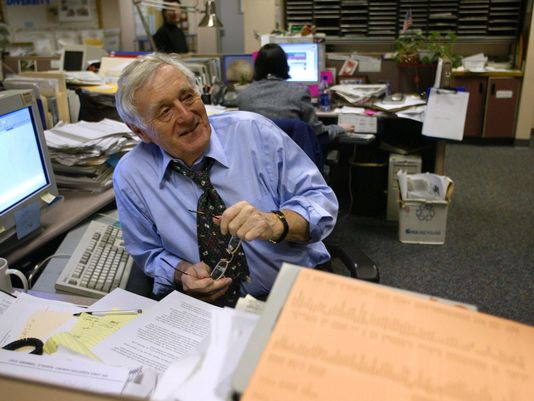Hundreds are gathering today to mourn the loss of one of Tennessee's most legendary journalists, a newspaperman whose accomplishments, considered individually, eclipse those in many people's lifetimes.
A confidant of Sen. Bobby Kennedy, a tireless fighter for civil rights, and an editor and publisher who used the pages of The Tennessean to expose dark things to the light and champion society's most vulnerable members, John Seigenthaler died Friday in Nashville at age 86.
Mr. Seigenthaler struggled early on with whether he'd devote his life to politics or journalism, dividing his time between passions. In the end, he gained the love and respect of noted lawmakers and the journalists who followed in the path he'd carved. In the hours after he died, their remembrances poured into The Tennessean's newsroom, their grief over an irreplaceable loss tempered with the promise of an enduring legacy.
"He was a newspaper man at heart who represented the highest tradition of journalistic integrity and reporting," said U.S. Rep. John Lewis of Georgia, one of the civil rights era Freedom Riders whom Mr. Seigenthaler covered as a reporter and later helped protect. "He used the power of the pen to help make this country a better place. He was a skillful negotiator, the consummate professional, yet he was a humble, down-to-earth gentleman who was dedicated and committed to his family and friends."
John Lawrence Seigenthaler Jr. was born July 27, 1927, to Mary Brew and John L. Seigenthaler, the oldest of eight siblings in a devout Catholic family. He attended Father Ryan High School, served three years in the Air Force and then attended George Peabody College for Teachers. Before he could graduate, his uncle got him a job in The Tennessean's newsroom.
The cub reporter covered his share of routine police beat and festival stories, but one of those simple pieces proved life-changing. He met his wife, Dolores Watson, when she took the stage at a June 1953 concert he covered in Centennial Park. The two were married in 1955. Son John Michael came along just as Mr. Seigenthaler's journalism career was blossoming — at the same time the civil rights movement was beginning to reshape the South.
![John Seigenthaler's visitation at the First Amendment Center[ID=12609599] ID=12609599](http://www.gannett-cdn.com/-mm-/d672d9b0eab382ad5d8058c851bf1c801b49e4d1/r=277x400/local/-/media/Nashville/Nashville/2014/07/13/1405301122000-NAS-SEIGVISITATION--1.jpg) He met Bobby Kennedy in 1957 after writing a series on growing corruption in the organized labor movement, particularly involving Jimmy Hoffa and his Teamsters union. The next year, Kennedy was chief counsel for the Senate labor rackets committee, and in 1959, the two took on a writing project together.
He met Bobby Kennedy in 1957 after writing a series on growing corruption in the organized labor movement, particularly involving Jimmy Hoffa and his Teamsters union. The next year, Kennedy was chief counsel for the Senate labor rackets committee, and in 1959, the two took on a writing project together.
"John wrote 'The Enemy Within' for Bobby Kennedy," said Randy Rayburn, a Nashville restaurateur and friend of Mr. Seigenthaler's. "He ghosted that for Bobby. I was hearing him talking about that recently, and he said Bobby took him to meet Joe Kennedy. Bobby said, 'I want you to meet John Seigenthaler, who wrote the book.'
"John was the greatest storyteller of my lifetime."
When John F. Kennedy was elected president in 1960, he appointed his brother attorney general. Bobby Kennedy, in turn, made Mr. Seigenthaler his administrative assistant in the U.S. Justice Department.
In May 1961, Bobby Kennedy got word that a group of Freedom Riders planned to leave from Nashville and asked Mr. Seigenthaler to talk them out of it, but to no avail. So Mr. Seigenthaler traveled to Montgomery in a rental car with Justice Department attorney John Doar to meet the bus. When they pulled up near the bus station and rolled down the car windows, they could hear screaming.
In one famous incident from that day, Mr. Seigenthaler saw two black girls climb into a cab, but the black driver would not let their white friend get in. As Mr. Seigenthaler rushed down the sidewalk to help, he was kicked in the ribs and fell to the ground, then was cracked in the head with a lead pipe.
Ever the journalist, Mr. Seigenthaler was named editor of The Tennessean at age 34 and continued to live among the worlds of newspapers, politics and social justice. He famously sent a reporter to live undercover for more than a year in the Ku Klux Klan. He fought for open government records and meetings, impervious to lawsuit threats.
"As a fierce and fearless champion of journalism and the First Amendment, Gannett was fortunate to have a remarkable man like John lead The Tennessean and later serve as the first editorial director of USA TODAY," said Gracia Martore, president and CEO of Gannett Co. Inc. "He set the standards high for providing fair and credible reporting — and those very important values that he taught and incorporated into his work live on today."
Mr. Seigenthaler stayed active in politics, but many times from behind the scenes in his role as editor. One young hire entered U.S. history.
Albert Gore Jr. came to work as a reporter at The Tennessean in 1971. The son of U.S. Sen. Albert Gore Sr., he was disgusted by politics after seeing his father lose his 1970 re-election campaign because he voted against the Vietnam War. But in 1976, Mr. Seigenthaler suggested Gore Jr. run for Congress. And he did, later becoming the 45th vice president of the United States.
Governors, congressmen and senators said they sought Mr. Seigenthaler's counsel across their years in office.
"To know John Seigenthaler was to reinvigorate your faith in America," former Gov. Phil Bredesen said. "He devoted his life as few others have to the ideals of our Constitution — as a part of the Kennedy team, a civil rights pioneer, an internationally respected journalist, a front-line defender of our First Amendment rights. He was always constructive, always passionate and always there.
"While I was mayor and later governor, and was wrestling with some problem and getting nowhere, he was the person I would sometimes go see, over at his office at the First Amendment Center, and just let my hair down and ask his advice. He always came through with something helpful and wise."
When Gannett CEO Al Neuharth decided to launch a new national paper called USA TODAY in 1982, he asked Mr. Seigenthaler to create and manage its editorial page. For a decade, Mr. Seigenthaler commuted between Washington and Nashville.
"John Seigenthaler was one of a kind, a classic journalist, as reporter, editor and coach, a role model for multigenerations of eager followers, a star motivator for the Chips Quinn Scholars who thrived on his presentations at their orientation to the world of journalism — Seig's brand of journalism," said John Quinn, former executive vice president of news for Gannett Co., who named the program for young journalists of color after his late son.
Mr. Seigenthaler retired as publisher, chairman and CEO of The Tennessean, and from USA TODAY, in 1991.
Along with being a newspaper writer and editor, Mr. Seigenthaler authored four books and developed relationships with writers that led to a weekly show for Nashville Public Television, "A Word on Words."
He maintained an office at the First Amendment Center at Vanderbilt University, which he founded. He hosted panels and discussion groups. He led the effort to raise money to restore Centennial Park and worked on the John Seigenthaler Chair of Excellence at Middle Tennessee State University.
"John was an extraordinary journalist, civic leader and mentor. He fought for what he thought was right throughout his career as a reporter and editor. He fought for public records and the First Amendment. He fought for civil rights. He fought corruption and the KKK. The nation today is shaped by his efforts," said Maria De Varenne, editor and news director at The Tennessean. "After his retirement, he continued to help Nashville, leading a variety of civic committees and projects. Our newsroom, Nashville and the nation has lost an incredible man."
Mr. Seigenthaler is survived by his wife, his son, daughter-in-law Kerry Brock and grandson Jack.
Honorary pallbearers
- Sen. Lamar Alexander
- George E. Barrett
- Gov. Phil Bredesen
- Martin S. Brown Sr.
- Grant Browning
- Lew Conner
- Rep. Jim Cooper
- Mayor Karl Dean
- James C. Duff
- William Forrester
- James C. Free
- Robert Frensley
- Mayor Richard Fulton
- Vice President Albert Gore Jr.
- Hal Hardin
- Aubrey B. Harwell Jr.
- Gov. Bill Haslam
- Henry Hooker
- John Jay Hooker Jr.
- Keel Hunt
- Tom Ingram
- Gordon E. Inman
- Rep. Joseph P. Kennedy II
- Robert F. Kennedy Jr.
- Bill Kovach
- Rev. James Lawson Jr.
- Dwight Lewis
- Judge Gilbert Merritt
- Charles Overby
- Ken Paulson
- Gene Policinski
- Peter S. Prichard
- John Quinn
- Wendell Rawls Jr.
- Randy Rayburn
- Sen. James Sasser
- Dr. William Kennedy Smith
- James D. Squires
- Frank Sutherland
- Charles Strobel
- Fate Thomas Jr.
- Steven Turner
In lieu of flowers
Condolence cards can be sent to the First Amendment Center, 1207 18th Ave. S., Nashville, Tenn., 37212. Contributions can be made to the First Amendment Center or to Room in the Inn, P.O. Box 25309, Nashville, Tenn., 37202.


